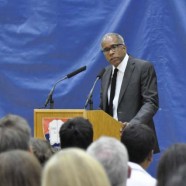
Milton’s 48th War Memorial speaker, Professor Randall L. Kennedy, told students, alumni and parents that despite “a chasm that separates the circumstances in which whites and blacks typically find themselves,” he is still an optimist about race relations in the United States. Professor Kennedy is the Michael R. Klein Professor at Harvard Law School, where he teaches in the fields of criminal law, contracts, and the regulation of race relations. In September, Professor Kennedy continued an important Milton tradition that brings to campus public figures who discuss core social and political issues.
Although the election of President Barack Obama was an amazing and pinnacle moment for America, Mr. Kennedy said many African Americans were deeply affected by the economic downturn and believe President Obama has “been too fearful of being charged with racial favoritism and has done too little to educate the public on the hazards that blacks face.”
“Beneath the malaise is a deep current of racial pessimism that has a long history in American and African-American thought,” said Mr. Kennedy. “Pessimists believe that racial harmony predicated on fairness is not part of the American future. They posit that America will not overcome its tragic racial past.”
Professor Kennedy made clear that he is an optimist while stressing that “intentional, invidious racial discrimination constitutes a force in American life that is far from negligible. It is a substantial headwind that blacks and other racial minorities face in many key areas, including housing, finance, employment, criminal justice, electoral politics, and markets for romance and marriage.”
Professor Kennedy said he is hopeful of the “prominent trajectory” of African Americans. He cited numerous statistics and laws that traced the long, slow path of blacks from an oppressed group of four million slaves in 1860 through the civil rights era to the election of the first African-American president.
“Changes in public attitudes, law and custom have clearly elevated the fortunes of African Americans as individuals and black America as a collectivity,” said Professor Kennedy. “Hard facts may give plausibility to the pessimistic tradition, but they make the optimistic tradition compelling. Despite the many wrongs that remain to be righted, blacks in America confront fewer racist impediments now than ever before in the history of the United States.”
The War Memorial Lecture was established in 1922 to honor those Milton graduates who gave their lives in World War I, and the foundation brings to campus notable guests who have dedicated their careers to the responsibilities and opportunities connected to leadership in a democracy.
Professor Kennedy was born in Columbia, South Carolina, in 1954. He attended St. Albans School, Princeton University, Oxford University, and Yale Law School. He served as a law clerk for Judge J. Skelly Wright of the United States Court of Appeals and for Justice Thurgood Marshall of the United States Supreme Court. He is a member of the bar of the District of Columbia and the Supreme Court of the United States. Awarded the 1998 Robert F. Kennedy Book Award for Race, Crime, and the Law, Professor Kennedy writes for a wide range of scholarly and general-interest publications. His most recent books are For Discrimination: Race, Affirmative Action, and the Law (2013), The Persistence of the Color Line: Racial Politics and the Obama Presidency (2011), and Sellout: The Politics of Racial Betrayal (2008). A member of the American Law Institute, the American Academy of Arts and Sciences, and the American Philosophical Association, Mr. Kennedy is also a Charter Trustee of Princeton University.



